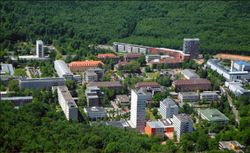Saarland University

The institutional identity of the Saarland University is defined according to three main areas of research and teaching: "BioMed Sciences", "Computer Sciences", and "European Studies". The IRTG perfectly fits into the BioMed area, which is characterized by its emphasis on applied research, conducted across several scientific networks that are clustered around Molecular Medicine, Human- and Molecular Biology and Nano-Biotechnology.
Cooperative educational and research projects based on the cooperation of the University Medical School and University hospital (campus 1 in Homburg), the natural sciences and life sciences faculties (on the second campus in Saarbrücken) include the Center for Human and Molecular Biology, the Competence Center of Molecular Medicine, the Collaborative Research Center SFB 894 and four Research Training Groups. The University also cooperates closely with the Leibniz Institute for New Materials (INM), the Helmholtz Institute for Pharmaceutical Research Saarland (HIPS), the Fraunhofer Institutes for Biomedical Engineering and Non-Destructive Testing, all of which are on or close to the university campus 2.
An important component of the university's strategy is to foster the structured training of graduate students. In 2007, Saarland University has implemented the university-wide graduate programme GradUS, which sets benchmarks for the doctoral training and the supervision of PhD thesis. GradUS also supplies administrative help and is the contact point for international graduate students.
A central element of GradUS is the special cooperation with the third-party-funded doctoral programmes. Current examples are, inter alia, five Research Training Groups funded by the DFG, the Max Planck Research School for Computer Science, the Graduate School of Computer Science funded by the Excellence Initiative, the European Graduate Program EuroPhD of the pharmacy network Galenos, and the European Graduate School for Neuroscience EURON. GradUS is of particular importance for the doctoral training at Saarland University, as the high quality of graduate research in these coordinated programmes defines the standards for other PhD programmes as well.
